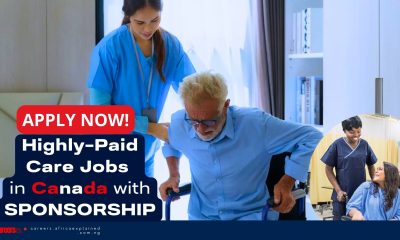Canada Sponsorship
Residence Mon Chez Nous Is Currently Hiring Multiple Candidates For Health Care Support Worker – 679 Jeanne Mance St, Casselman, ON

Job Details
Job Types: Full-time, Part-time, Permanent
Location: 679 Jeanne Mance St, Casselman, ON
Salary: $18.00-$25.00 per hour
We are looking for a Care Worker to join our team and provide quality care to our clients. The successful candidate will be responsible for providing support to clients in their homes, assisting with daily activities, and helping them to remain independent. The ideal candidate will have a compassionate and caring nature, excellent communication skills, and the ability to handle challenging situations with patience and understanding.
Responsibilities:
- Provide physical and emotional support to clients.
- Assist clients with daily activities such as bathing, dressing, and grooming.
- Maintain a safe and clean environment for clients.
- Monitor client health and well-being.
- Provide companionship and social interaction to clients.
- Assist with meal preparation and other household tasks.
- Transport clients to medical appointments or other activities.
Job Type: Full-time
Salary: $21.00-$22.00 per hour
Expected hours: 40 per week
Benefits:
- Dental care
- Paid time off
Schedule:
- 8 hour shift
- Day shift
- Evening shift
- Monday to Friday
- Night shift
- Weekends as needed
Education:
- Secondary School (preferred)
Licence/Certification:
- Class 5 Licence (preferred)
Shift availability:
- Day Shift (preferred)
- Night Shift (preferred)
- Overnight Shift (preferred)
Work Location: In person
What skills and qualities are important for a Unregulated Care Provider?
As an Unregulated Care Provider, also known as an UCP, you would be responsible for providing care and support to individuals in various settings. While specific requirements and regulations may vary depending on the jurisdiction, there are several skills and qualities that are generally important for a UCP. Here are some of them:
- Empathy and compassion: A UCP should genuinely care about the well-being of the individuals they are supporting. Empathy allows you to understand their feelings and concerns, while compassion helps you provide emotional support.
- Communication skills: Effective communication is essential in building relationships with the individuals you are caring for. It involves active listening, clear verbal and non-verbal communication, and the ability to convey information in a way that is easily understood.
- Patience: People receiving care may have different needs, abilities, and limitations. Patience is crucial in providing assistance, as it allows you to maintain a calm and understanding demeanor, even in challenging situations.
- Flexibility and adaptability: Healthcare environments can be unpredictable, and the needs of the individuals you care for may change. Being flexible and adaptable helps you adjust to different situations and provide appropriate care as circumstances require.
- Observational skills: A UCP should be observant and attentive to the needs and behaviors of the individuals they support. This helps in identifying any changes in condition or behavior that may require medical attention or additional support.
- Time management and organizational skills: As a UCP, you may have multiple tasks and responsibilities to manage. Effective time management and organizational skills enable you to prioritize tasks, meet deadlines, and ensure that all necessary care is provided.
- Respect for diversity and cultural sensitivity: People from diverse backgrounds may require care, and it is important to respect their individuality, cultural practices, and beliefs. Being culturally sensitive fosters an inclusive and respectful environment.
- Basic medical knowledge: While UCPs do not typically provide medical treatments, having a basic understanding of common health conditions, medications, and first aid can be beneficial in recognizing symptoms, assisting with medication management, and responding appropriately in emergencies.
- Teamwork and collaboration: UCPs often work alongside other healthcare professionals and support staff. Being a team player, communicating effectively with colleagues, and collaborating on care plans contribute to a cohesive and efficient healthcare team.
- Professionalism: Maintaining a professional attitude and behavior is important in any healthcare role. It involves respecting confidentiality, following ethical guidelines, maintaining personal boundaries, and acting in the best interests of the individuals you are supporting.
Remember that specific requirements for UCPs can vary depending on the location and the specific care setting. It’s essential to consult the guidelines and regulations of your jurisdiction to ensure you meet the necessary qualifications and standards.
What education and certification are required to become a Unregulated Care Provider?
The term “Unregulated Care Provider” typically refers to a healthcare role that does not have specific regulatory requirements or mandatory certifications. However, the qualifications and requirements can vary depending on the jurisdiction and the specific care setting. Since there are no universally standardized requirements for UCPs, it’s important to research the regulations and guidelines specific to your location.
In general, UCPs often enter the field with a high school diploma or equivalent. Some employers may prefer or require additional education, such as a post-secondary certificate or diploma in a relevant field like healthcare or personal support. These programs can provide foundational knowledge and skills related to caregiving, health, and safety.
While certifications are not mandatory for UCPs, acquiring relevant certifications can enhance your knowledge and demonstrate your commitment to providing quality care. Examples of certifications that may be beneficial include:
- First Aid and CPR: Certification in First Aid and Cardiopulmonary Resuscitation (CPR) can be valuable for UCPs, as it equips them with life-saving skills and the ability to respond to emergencies.
- Medication Administration: Some jurisdictions offer certification programs for UCPs to safely administer medications. This training ensures that you understand the principles and protocols of medication management.
- Dementia Care: Certifications or specialized training in dementia care can be beneficial if you are supporting individuals with dementia or Alzheimer’s disease. These programs provide knowledge about the condition, communication strategies, and techniques for providing person-centered care.
It’s important to note that while these certifications can be advantageous, they may not be universally required or recognized across all jurisdictions. Therefore, it’s crucial to research the specific requirements and recommendations in your area and consult with potential employers or relevant regulatory bodies to determine the desired qualifications.
Furthermore, ongoing professional development and continuing education can help you stay updated with best practices, new techniques, and changes in the field of caregiving. Taking advantage of training opportunities and staying informed about the latest developments can further enhance your skills as an Unregulated Care Provider.
Who can apply to this job?
The employer accepts applications from:
- Canadian citizens and permanent or temporary residents of Canada.
- Other candidates with or without a valid Canadian work permit.
How to apply
Online: Apply On Company WebSite
What is the work environment like for Unregulated Care Provider?
The work environment for Unregulated Care Providers (UCPs) can vary depending on the specific care setting and the individuals they are supporting. Here are some common work environments for UCPs:
- Residential Care Facilities: UCPs may work in assisted living facilities, nursing homes, group homes, or other residential care settings. These environments typically involve providing care and support to individuals who require assistance with daily activities, such as personal hygiene, dressing, meal preparation, and medication management. UCPs may work as part of a team, collaborating with other healthcare professionals and support staff.
- Home Care: UCPs may provide care to individuals in their own homes. This can involve visiting clients in their residences and assisting with various tasks, such as meal planning, light housekeeping, medication reminders, and companionship. Home care UCPs often work independently, although they may be supervised by a nurse or other healthcare professional.
- Community-Based Care: UCPs can also work in community-based settings, such as adult day centers or community health clinics. In these environments, UCPs may support individuals who require assistance during the day, providing personal care, engaging in activities, and facilitating social interactions.
- Hospital or Healthcare Facilities: UCPs may work in hospitals or other healthcare facilities, providing non-medical care and support to patients. This can involve tasks such as assisting with mobility, providing emotional support, and ensuring patients’ comfort.
The work environment for UCPs can be dynamic and challenging at times. It often involves working closely with individuals who may have physical, cognitive, or emotional challenges. UCPs may encounter situations that require problem-solving, adaptability, and the ability to remain calm under pressure.
Additionally, UCPs may work varied hours, including evenings, weekends, and holidays, to ensure around-the-clock care for individuals in need. Shift work and flexibility in scheduling are common in this field.
🔥Latest Job Vacancies in Canada (Updated Daily)
🇨🇦 Child Caregiver Needed in a Private Home (SPONSORSHIP AVAILABLE) – Ontario
Apply Now🇨🇦 200+ Sponsorship Visa Jobs and Work Opportunities in Canada – APPLY NOW
Apply Now🇨🇦 Work For Foreigners: Personal Support Worker (SPONSORSHIP AVAILABLE) – Ontario
Apply NowIt’s important to note that the work environment and conditions can differ based on the specific policies, practices, and regulations in your jurisdiction, as well as the organization or employer you work for.











